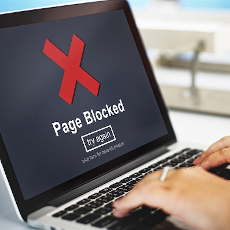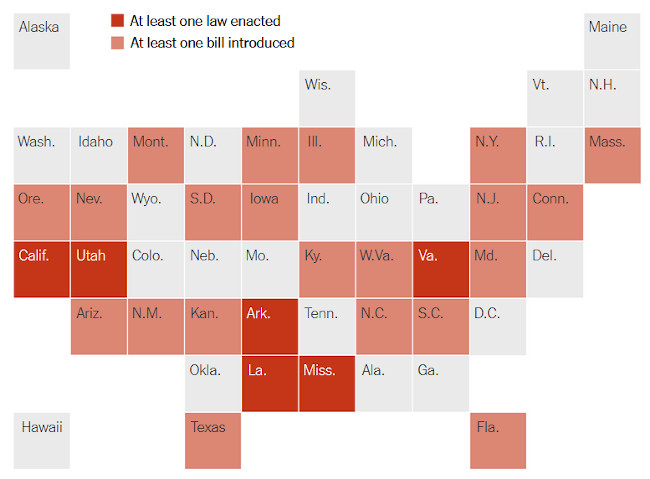May 5, 2023 | The Biz
The ongoing threat of age verification laws
 The next round in the battle over access to online porn has begun, with various levels of government once again pushing through age verification legislation. The aim, politicians say, is to ensure that adult content -- specifically porn -- isn't accessible to minors over the Internet.
The next round in the battle over access to online porn has begun, with various levels of government once again pushing through age verification legislation. The aim, politicians say, is to ensure that adult content -- specifically porn -- isn't accessible to minors over the Internet.
Last year, Louisiana passed a law that bans access to sites like PornHub unless the person has proven they're an adult using the state digital drivers license app, LA Wallet. Parents can sue for damages if a child views an adult site that doesn't have a verification process; and sites in violation can be fined up to $5000 a day.
According to the law: "Pornography contributes to the hypersexualization of teens and prepubescent children and may lead to low self-esteem, body image disorders, and increases in problematic sexual activity at younger ages, and increased desire among adolescents to engage in risky sexual behavior."
“We have agreed as a society not to let a 15-year-old go to a bar or a strip club,” explained Laurie Schlegel, the Republican state rep behind the Louisiana law. “The same protections should be in place online so that you know a 10-year-old is not looking at hard-core pornography.”
Other states have quickly followed. In fact, 27 states have passed or introduced legislation requiring some form of age verification for some sites.

Free Speech Coalition, by Elle Koeze
Utah was the latest state to pass such legislation, with the new law coming into effect this week. MindGeek, the company behind sites like Pornhub and Men.com, was quick to respond.
On Tuesday, the company blocked access to Pornhub in Utah, asserting that the law was ineffective, raised privacy concerns and actually “put … children at risk."
“Requiring adults to verify their ages – and expose their identities – before accessing certain websites will inevitably deter them from going to those sites,” an ACLU (American Civil Liberties Union) spokesperson, Aaron Welcher, said. “As Pornhub’s response has shown, it will also impose potentially prohibitive costs on content providers.”
There is also a concern about which sites are being deemed "too adult" or "inappropriate." For example, a website that provides support for queer youth may cross the line in more conservative jurisdictions, making important resources and support more difficult to find.
And it is not just a US issue. Germany, France, the UK and Australia are working on their own laws.
“The concerns about young people accessing adult websites are real and widespread; less widespread is the understanding of limitations of various age-verification tools, and of the new dangers they might pose,” explained Irina Raicu, director of the Internet Ethics Program at Santa Clara University’s Markkula Center. “Many regulators and others seem to think of age verification as a solved problem; technologists and privacy activists, including activists focused on protecting children, are trying to explain that’s not the case.”
“While there are multiple proposed laws on age verification throughout the world, we are not aware of any, thus far, that achieve their aim of protecting children from age-inappropriate material online,” added a spokesperson for MindGeek.
We do wonder why, if the point of the law is to protect children, why Republicans refuse to implement sensible gun laws like every other first-world nation has.
it is doubtful if any of the US state-led age verification laws are constitutional, though with the current makeup of the Supreme Court, who knows? And don't worry, online hate and misinformation is still just fine.
Site Reviews
93 Bel Ami Online [visit]91 Corbin Fisher [visit]
89 ASGmax [visit]
88 Cocky Boys [visit]
88 Freshmen [visit]
88 Lucas Entertainment [visit]
88 Blake Mason [visit]
87 Chaos Men [visit]
87 Tim Tales [visit]
86 Broke Straight Boys [visit]
86 Fisting Inferno [visit]
85 Falcon / Hot House Studios [visit]
85 Next Door Studios [visit]
85 Bait Buddies [visit]
85 Boynapped [visit]
Top | Home | About Us | Contact Us | Reviews | Galleries | News | What's Up?
BananaGuide: the gay man's guide to porn
© 2000, 2025 Untangled Web Inc.
